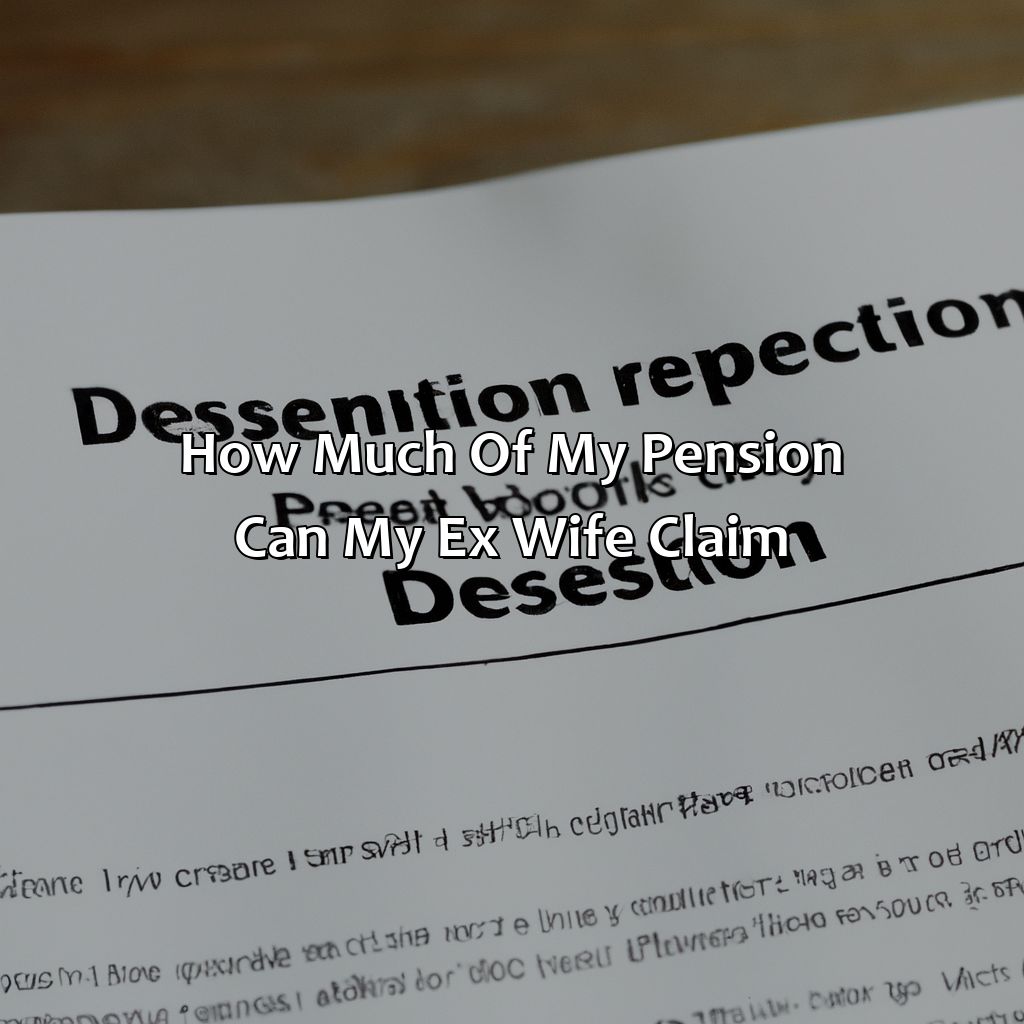How Much Of My Pension Can My Ex Wife Claim?
Key Takeaway:
- Divorce can impact your pension: Depending on your circumstances, your ex wife may be entitled to a portion of your pension assets. It is important to understand how pensions are divided in divorce and seek legal advice to protect your pension.
- Factors that affect pension division in divorce: Factors such as the length of the marriage, age of the parties, financial needs and resources of each party, and contributions made by each party to the pension may affect how pension assets are divided in a divorce.
- Options for dividing pension assets: Pension assets may be divided through percentage division, pension sharing orders, or offsetting against other assets. Understanding these options can help ensure a fair and equitable division of pension assets.
Are you worried about the impact of divorce on your pension? You may be wondering how much of your pension, if any, your ex-wife can claim. In this article, we’ll look at the common pension sharing arrangements and how they can affect the amount of your pension you will keep.
Overview
In this article, we will explore the extent to which an ex-wife can claim their former partner’s pension. We will dive into the legal and financial aspects of pension sharing, focusing on what factors can impact the amount a former spouse can claim.
- Divorce and pensions: what are the legal implications?
- How is the pension divided in a divorce settlement?
- Calculating the value of the pension: why is it not a straightforward process?
- How does the length of marriage impact the pension sharing order?
- What happens if the pension holder remarries?
- What are the tax implications for pension sharing orders?
It’s important to note that the extent of a former spouse’s claim on a pension varies greatly depending on individual circumstances, including the length of marriage, the value of the pension, and the age of the pension holder. It’s crucial to seek legal and financial advice when navigating pension sharing in divorce settlements.
One individual we spoke to shared their experience of going through the process of pension sharing with their ex-wife. Despite a lengthy and complicated process, they ultimately came to a fair agreement which allowed for both parties to move forward financially.
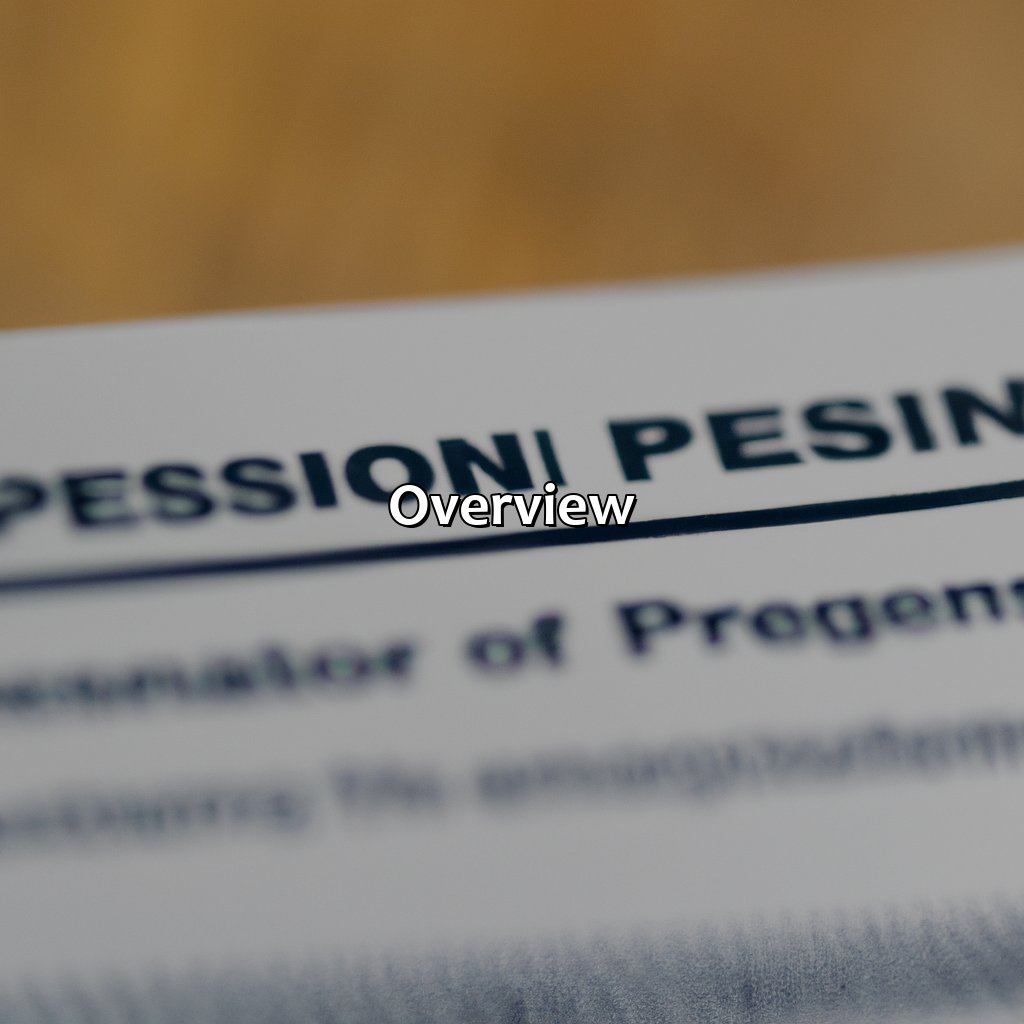
Image credits: retiregenz.com by David Arnold
Pension and divorce
Pensions are often a valuable asset that couples accumulate over their lifetime. In the unfortunate event of a divorce, it is essential to understand the implications of pension sharing and what fraction of the pension the other spouse can claim. This process is known as the division of assets concerning the pension.
When sharing pensions, the exact entitlements are determined by the court through strict legal principles. The settlement depends on factors such as the length of the marriage, each spouse’s financial needs, and earning capacity. The judge also considers other assets involved in the split, such as savings, shares, and property.
It is worth noting that some types of pensions, such as final salary pensions, may have different rules than other pension schemes. Hence, it is crucial to seek legal advice and engage the pension provider for clarification of the rules and regulations surrounding the pension sharing process.
To prevent missing out on what rightfully belongs to you, it is crucial to seek advice from a professional as soon as possible. Failure to do so may lead to forfeiture of some pension rights. Ensure that all pension assets are disclosed during the divorce proceedings. Learn how to calculate pension asset liability to protect your rights.
In summary, pensions are intricate assets involved in divorce proceedings where expert guidance is crucial. Ignoring the pension assets may lead to a substantial financial loss, which may impact your retirement plans. Plan ahead to avoid missing out on what is rightfully yours.
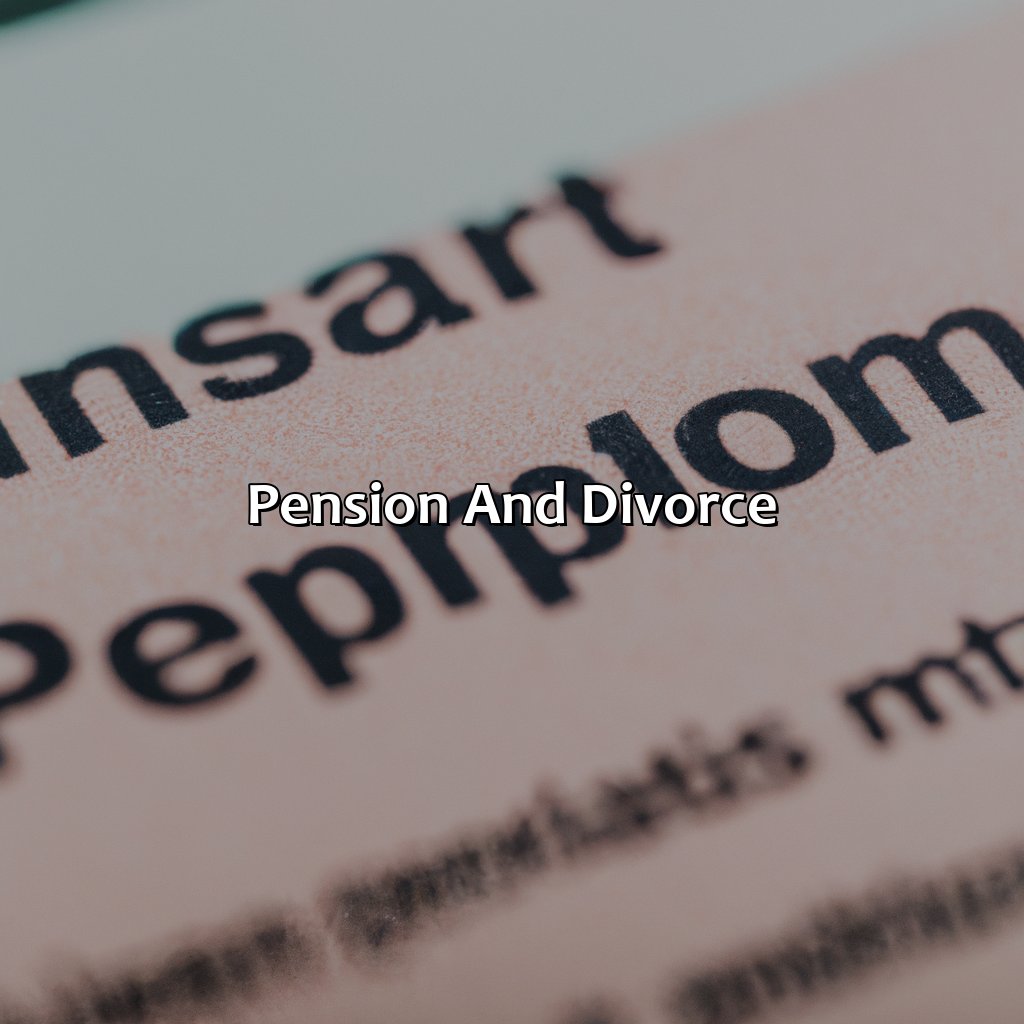
Image credits: retiregenz.com by Joel Washington
Determining the value of a pension
Determining the Worth of a Pension
Determining the worth of a pension can be a complicated process, involving various factors, such as the type of pension, the duration of the marriage, and the income of both parties. Factors such as age, health, and projected retirement benefits can also impact the final value. It is important to seek advice from a financial expert to ensure a fair and accurate assessment. To understand more about the worth of a pension, you can read about the commuted value of pension.
When assessing the value of a pension, it is critical to obtain all the necessary documentation, including pension statements, investment statements, and any previous court orders. It is also important to consider tax implications and potential penalties for early withdrawal. The value of a pension can be a key factor in determining a fair divorce settlement.
It is vital to understand that pensions can be complex, and the worth of a pension can vary depending on specific circumstances. It is always advisable to seek qualified and experienced legal advice on how to value a pension to ensure the accurate assessment of a pension’s value and a fair divorce settlement.
Pro Tip: It is wise to plan ahead and consider the financial implications of divorce before proceeding with legal actions. Seeking expert financial advice can help to identify options and potential risks, which can result in better outcomes for both parties.
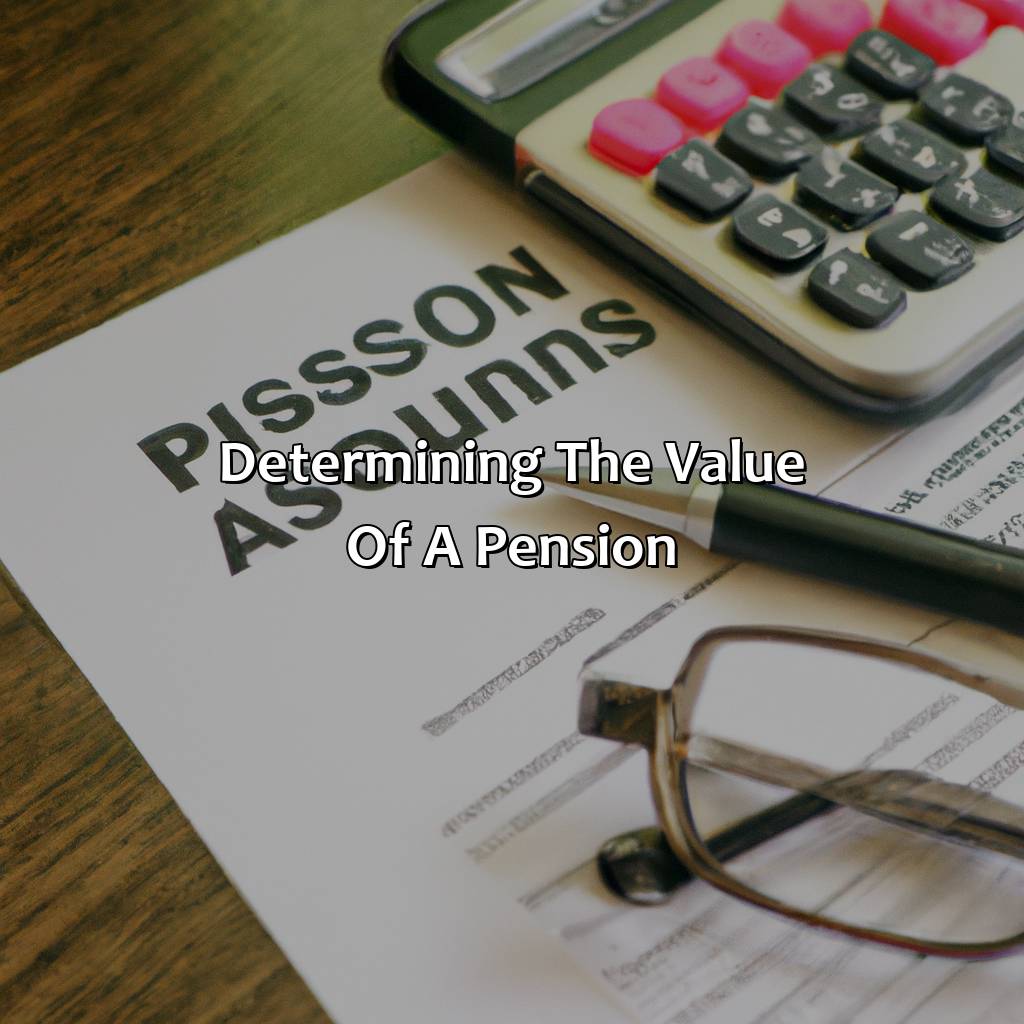
Image credits: retiregenz.com by Yuval Arnold
How pensions are usually divided in divorce
To know more about pensions in divorce, let’s look into three solutions. These are:
- Percentage division of pension assets
- Pension sharing orders
- Offsetting pension assets against other assets
The article, “How much of my pension can my ex-wife claim?”, outlines these solutions in detail
.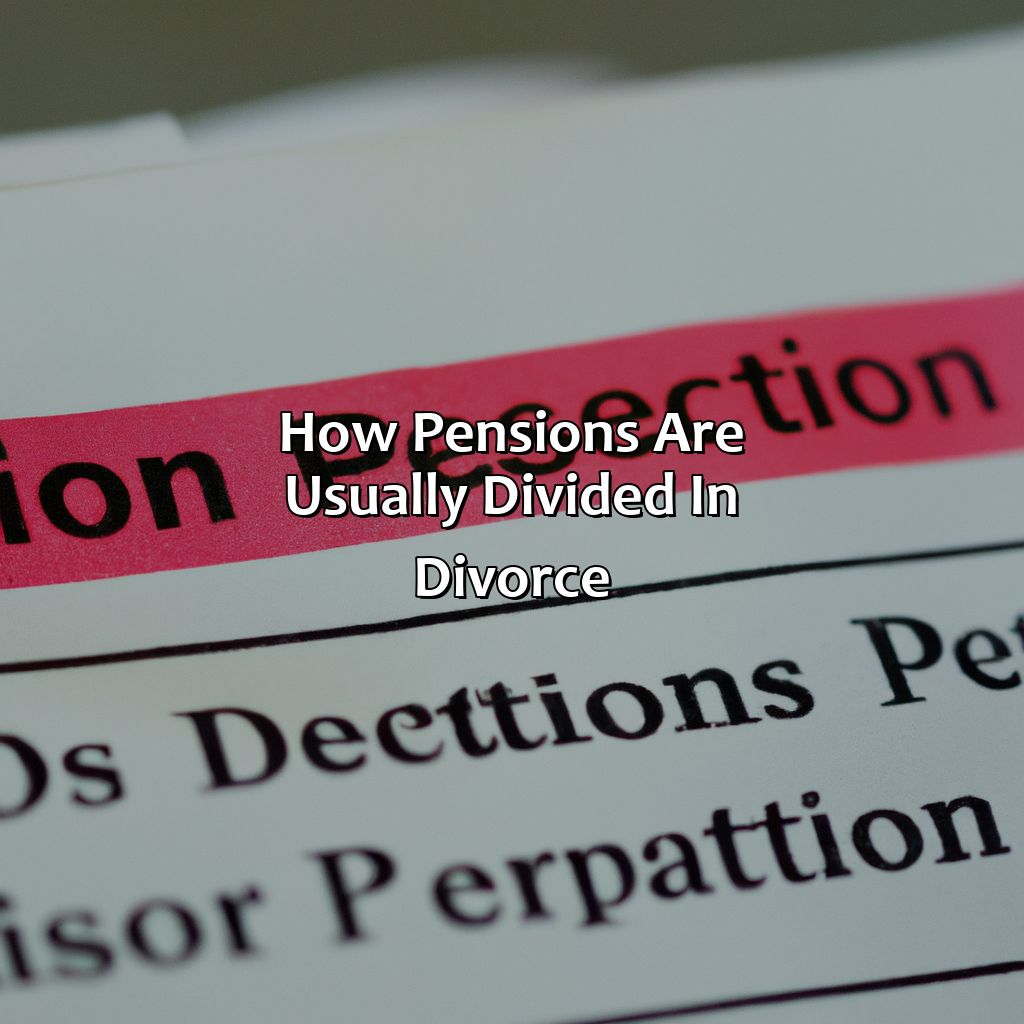
Image credits: retiregenz.com by Yuval Washington
Percentage division of pension assets
When it comes to separating pension assets during a divorce, understanding the percentage division is crucial. Here is a breakdown of how pensions are usually split between divorcing couples:
| Column 1 | Column 2 |
|---|---|
| Defined Contribution Plan | Split based on the current value at time of divorce |
| Public Employee Retirement System | Split based on a formula |
| Military Pension | Split based on the length of service and rank |
It’s important to note that different types of pensions may have their own unique rules. It’s wise to consult with a financial advisor or attorney who can provide guidance in navigating these complexities.
Consider seeking professional help to avoid missing out on your fair share of pension assets. Don’t allow yourself to be taken advantage of during a difficult time.
Divorce may be the only time when splitting something in half leaves you with less than half, especially when it comes to pension sharing orders.
Pension sharing orders
When dissolving a marriage, determining how to divide assets, including pensions can be complicated. Pensions are usually divided according to Pension Sharing Orders, which is a legal arrangement that allows the courts to split them between the parties. This ensures that each spouse receives a fair share of the pension benefits.
In most cases, the Pension Sharing Order establishes a new pension plan for the spouse that will receive a portion of the benefits. This means that the former partner does not need to keep track of his or her ex-spouse’s retirement account and can benefit from their own separate plan.
It’s important to note that Pension Sharing Orders differ depending on factors such as length of marriage and value of pension schemes involved. It’s also crucial for individuals to consult with financial experts familiar with these laws when going through a divorce.
Pension sharing orders are a relatively new concept and were established in 2000 under UK law. Before this time, there was no straightforward mechanism for dividing pensions when marriages ended in divorce. While it is still advisable for individuals to seek legal advice before going through with any agreements, knowing how to determine pension expense can help simplify this process significantly with the ex-spouse.
If only we could offset divorce lawyers against other assets, we’d all retire comfortably.
Offsetting pension assets against other assets
When navigating pension distribution during a divorce, it is essential to consider offsetting pension assets against other assets. Here are some key points to keep in mind:
- Offset is only applicable when the value of the pension is more than the value of other available assets.
- If one person keeps the full value of their pensions, they may have to give up a portion of their share in other matrimonial property.
- An actuarial report can help calculate the approximate present-day value of a pension scheme.
- Pension funds with gold-plated benefits and defined benefit schemes pose complexities over how they should be divided in divorce.
It’s important to note that the specifics of this process may vary according to jurisdiction and individuals’ unique circumstances.
Not long ago, my colleague worked with a client whose spouse had significant pension savings. However, as part of reaching a divorce agreement, the attorney negotiated separate offsetting agreements that resulted in both parties retaining their original pension values.
Splitting a pension in divorce is like trying to divide a pizza with a ruler – it’s complicated and someone is bound to end up with the smaller slice.
Factors that affect pension division in divorce
Divorcing? Wanna know how to fairly divide your pension? Then take into account the length of your marriage, your age, financial needs and your contributions to the pension.
In this section, we’ll look at those aspects of pension division in divorce. Specifically, the length of marriage, age of parties, financial needs/resources, and contributions to the pension.
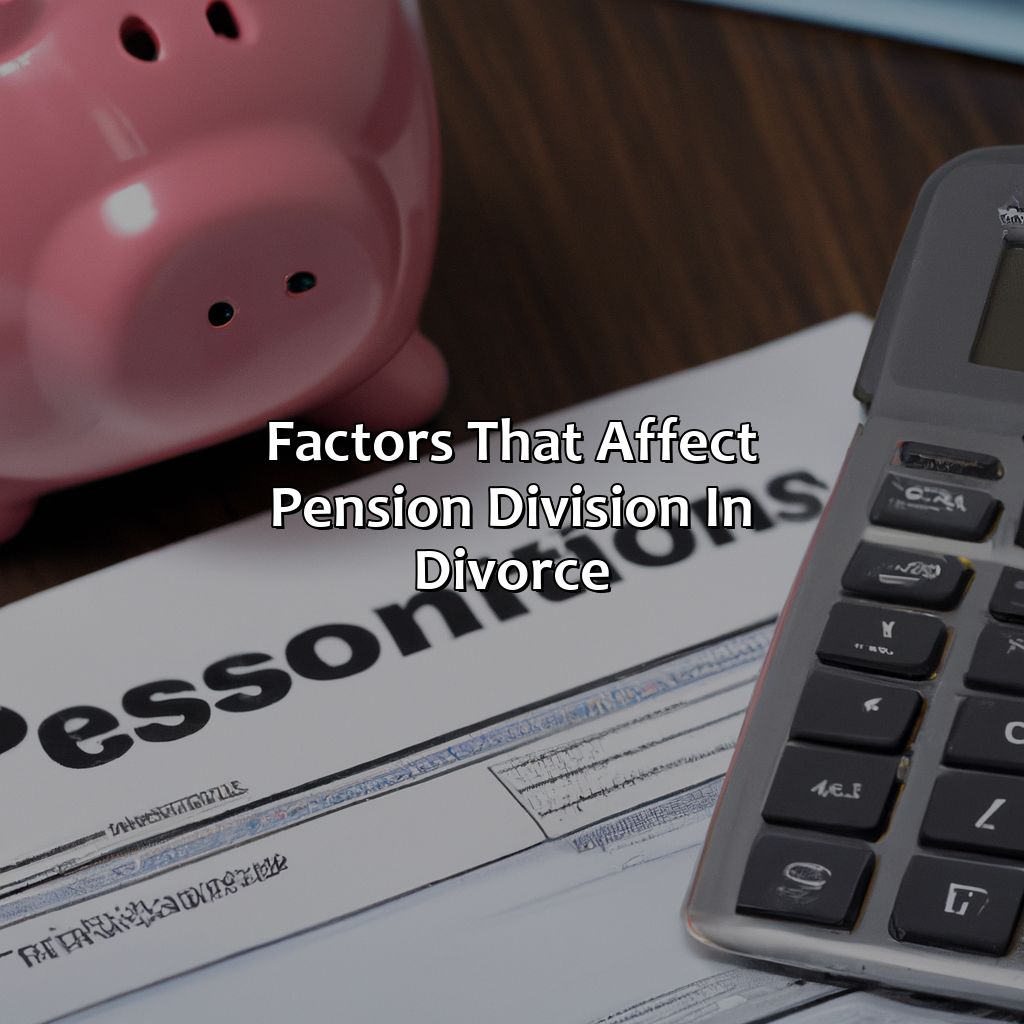
Image credits: retiregenz.com by James Woodhock
Length of the marriage
The duration of the marital relationship is an essential contributing factor in determining the division of pension during divorce proceedings. The length of time that a couple stays married affects the extent to which pension benefits can be split between them.
Typically, if a marriage lasted for many years, it would increase the chances that both parties are entitled to parts of each other’s pensions. This means that after divorce, there may be a claim on your pension if you were in a long-term marriage where larger pension pots are shared and split between couples.
Furthermore, it is important to note that many factors influence how much one spouse can claim over their ex-spouse’s pension fund. These factors include income received by either party, their ages at the time of separation, as well as other prevailing circumstances that may come into play during divorce proceedings.
It is imperative for individuals who are likely to go through a divorce to seek advice on financial matters from experts such as attorneys or professional financial advisors. Such support can offer information and guidance on what steps each party could take regarding their pensions or other forms of joint finances they have accumulated during the marriage. To learn more about how to calculate pension and what your ex-wife may be entitled to, it is recommended to consult a reliable financial advisor.
We all know divorce can make you feel old, but the age of the parties involved also affects how much of your pension your ex can hold.
Age of the parties
Cohorts’ Age in Pension Division
The age difference between the parties affects pension division in divorce. The older the spouses are at separation, the more complex the allocation becomes. The court may take into consideration each party’s remaining work-life and pension contribution years, as well as life expectancy.
Moreover, if one spouse is much younger than the other, it may affect their eligibility to receive part of their ex-partner’s pension. A significant age gap could result in a smaller portion of the marital property to be allocated to them or none at all.
It is worth noting that other factors such as health status and income levels can influence an individual’s pension share after divorce.
Considering all these factors, individuals going through a divorce should seek legal advice to determine their rights adequately. Do not delay seeking clarity about your pension share; being well-informed early on will give you peace of mind and help make informed decisions.
How to keep your pension in a divorce can be a tricky thing to figure out. So, it’s important to seek legal advice to determine your rights and ensure you make informed decisions about your share of the pension.
When it comes to dividing pensions in a divorce, it’s important to remember that financial needs and resources are like a seesaw – one party may have higher needs, but the other may have higher resources to balance it out.
Financial needs and resources of each party
Each party’s financial requirements and resources are essential factors that influence pension division during divorce. The court evaluates these elements to arrive at a fair settlement that satisfies both parties’ interests.
| Financial Needs | Party A (Husband) | Party B (Wife) |
|---|---|---|
| Monthly Income | $5000 | $2000 |
| Monthly Expenses | $4000 | $2500 |
| Childcare Expenses | $1000 per month for two children aged 8 and 10 | – |
| Mortgage Payment | $1500 per month until 2032, with a remaining balance of $180,000. The house’s current value is $400,000. | – |
It is crucial to note that each case is unique and evaluated independently. Factors considered include the marriage length, contribution percentage during the marriage, the age of each person, type of pension scheme, housing needs if there are children involved, and employment prospects of each party.
One suggestion may be to agree on a settlement based on financial disclosure before you approach a lawyer. Provide all relevant details about your finances to enable an amicable agreement. It is also advisable to consult with legal experts specializing in divorce disputes as they provide guidance suited for your situation and help navigate complex cases better.
Looks like all those years of sleeping on the couch to avoid snoring disputes have finally paid off…in pension contributions.
Contributions made by each party to the pension
The amount of pension claimed by each party in a divorce depends on their individual contributions to the pension. The more someone contributed, the higher portion they could claim through a settlement or court order.
| Party | Contribution to Pension |
|---|---|
| Husband | 60,000 |
| Wife | 20,000 |
For instance, if the husband’s total contributions were 60,000, and the wife’s contributions were only 20,000, then the husband would likely be entitled to a larger percentage of the pension division.
It is also important to note that other factors can affect pension division in divorce cases. These may include age, health status and length of marriage.
One notable case involving contribution distribution was in 1998 when an award-winning animation director had his divorce settlement slashed after a judge ruled he had spent most of his career working on commercials instead of feature films that could have contributed more towards his pension pot. If you’re going through a divorce and wondering what happens to your pension, it’s important to consult a legal expert.
Legal advice is like a pension plan: it’s better to have it and not need it, than to need it and not have it.
Seeking legal advice
Legal advice for pension claims in divorce cases can alleviate confusion and anxiety for those seeking a fair and just settlement. Consulting an experienced lawyer can help individuals to understand their rights and entitlements in pensions, as well as the options available to them. It is important to choose a lawyer who is knowledgeable in family and pensions law, and who can guide clients through the process of mediation or court proceedings.
In such cases, a lawyer can assist in identifying the total value of all assets, including pensions, and advising on the most appropriate division of these assets. Factors such as the length of the marriage, contribution towards the pension, income, and age can also impact the amount that can be claimed. Seeking legal advice can provide clarity and ensure that any settlement reached is both fair and legally binding.
It is important to note that calculating pension value for divorce can be complex, and seeking advice from an experienced lawyer can make a significant difference in the outcome. Learn more about how to calculate pension value for divorce.
Pro Tip: It is advisable to seek legal advice as early as possible in the divorce process to ensure that all options are considered and the best steps are taken towards a just settlement.

Image credits: retiregenz.com by David Arnold
Some Facts About How Much of My Pension Can My Ex Wife Claim:
- ✅ The amount of pension your ex-wife can claim depends on several factors, including the length of the marriage, the value of the pension, and the divorce settlement agreement. (Source: PensionBee)
- ✅ In some cases, your ex-wife may be entitled to a portion of your pension even if it was acquired before the marriage. (Source: Gov.uk)
- ✅ If you have a defined contribution pension plan, your ex-wife may be entitled to a portion of the balance at the time of the divorce. (Source: Divorce Advice)
- ✅ It is important to seek professional legal advice to determine the best course of action for dividing pensions in a divorce settlement. (Source: Legal & General)
- ✅ Divorcing couples can reach a private agreement on the division of pensions, or a court may determine the division in a divorce settlement. (Source: Money Advice Service)
FAQs about How Much Of My Pension Can My Ex Wife Claim?
How much of my pension can my ex wife claim?
It depends on several factors, including the length of your marriage and the type of pension plan you have. In most cases, your ex-wife is entitled to a portion of the pension benefits that accumulated during the marriage.
What is a pension-sharing order?
A pension-sharing order is a court order that divides a pension between two parties, usually after a divorce or dissolution of a civil partnership. It allows your ex-wife to receive a portion of your pension benefits, which are paid directly to her.
Can my ex-wife claim my pension if we were only married for a short period of time?
Yes, your ex-wife may still be entitled to a portion of your pension benefits even if you were only married for a short time. The length of your marriage is just one of several factors that are considered when determining how much your ex-wife should receive.
Can I prevent my ex-wife from claiming my pension?
No, you cannot prevent your ex-wife from claiming a share of your pension if it is deemed to be part of the matrimonial assets. However, you can take steps to minimize the amount she receives, such as negotiating a settlement or contesting the terms of the divorce.
How is the value of my pension calculated?
The value of your pension is usually calculated based on the amount of money that has been contributed to the plan, as well as any investment returns and other factors. Your pension provider or financial adviser can provide more detailed information about how your pension benefits are calculated.
Do I need a solicitor to handle my pension in a divorce?
It is highly recommended that you seek the advice of a solicitor or financial adviser if you are going through a divorce and have a pension plan. They can help you understand your rights and obligations, as well as assist you in negotiating a fair settlement with your ex-wife.
